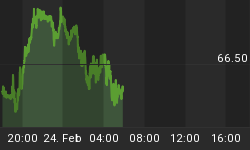Below is a snippet from the latest weekly issue from www.GoldForecaster.com | www.SilverForecaster.com
Central Bank buys 20 tonnes of locally mined gold for its reserves.
In an almost unnoticed move in the market a dramatic event took place in January of this year. We have long talked of the easy way for a Central Bank to accumulate gold reserves unobtrusively. Usually we have pointed to Russia and China when this is discussed as they are the two nations that have expressed major concerns about the future of the $ and who are producers of gold. Should they decide to acquire gold for their reserves in earnest, the first move they are likely to make is to buy the locally mined gold.
 This is because firstly, they would not be seen in the market place, nor drive up the price.
This is because firstly, they would not be seen in the market place, nor drive up the price.- Secondly, to the extent they bought local gold as opposed to selling it in the market, they would not accumulate the U.S.$ for it.
We were quite surprised to see that South Africa in January did just this. Certainly the South African Reserve Bank acted with a dash of common sense towards gold for a change. In January, the South African Reserve Bank's holdings of gold reserves increased to 4.684 million ounces [145 tonnes] from 3.990 million ounces [124 tonnes] in December 2006. In simple terms S.A. is switching some U.S. dollars into gold.
But perhaps more significantly as the gold market tightens and changes in supply or demand have a greater impact than before, making the market more volatile, this move meant that in January 20 tonnes of gold from South Africa did not go into the open gold market, placing more upward pressure on the gold price.
This would not affect the South African gold miners, as they would have been paid in Rands, anyway.
But a Central Bank turning buyer from seller off-market, would tighten the market by lowering supplies, just as dramatically as if it entered the market to buy.
China to rapidly increase gold production.
With South Africa's actions in mind, the market may have wet its lips at the thought of China's plans to produce 1,300 tonnes of gold and verify gold mine reserves of 3,000 to 5,000 tonnes in the five-year period between 2006 and 2010 [according to the State Development and Reform Commission].
 In this period they intend to make efforts to readjust distribution of the gold industry, intensify gold mine prospecting, promote industrial restructuring and upgrade mining and production technology and equipment. Meanwhile, domestic gold enterprises will be encouraged to participate in international competition.
In this period they intend to make efforts to readjust distribution of the gold industry, intensify gold mine prospecting, promote industrial restructuring and upgrade mining and production technology and equipment. Meanwhile, domestic gold enterprises will be encouraged to participate in international competition.
An interesting objective and one we hope they will achieve. But don't expect any of that gold to leave China. There's little chance of that happening. Why? We do believe domestic consumption will grow, but not to this extent unless a major reformation of the Chinese distribution system happens. So what of the extra gold?
We believe that this will find its way into the Chinese gold and foreign exchange reserves. After all, why on earth, would they want to sell it, they don't want more of the U.S. $ or any other foreign currency.
Last year, China produced a record 240 tonnes of gold, a growth of 7.15% year-on-year, and its gold mine reserves increased by more than 650 tonnes. This was all used inside China. In 2007, the gold output is projected to hit 260 tonnes and the gold mine reserves to rise 700 tonnes.
Please subscribe to www.GoldForecaster.com for the entire report.















